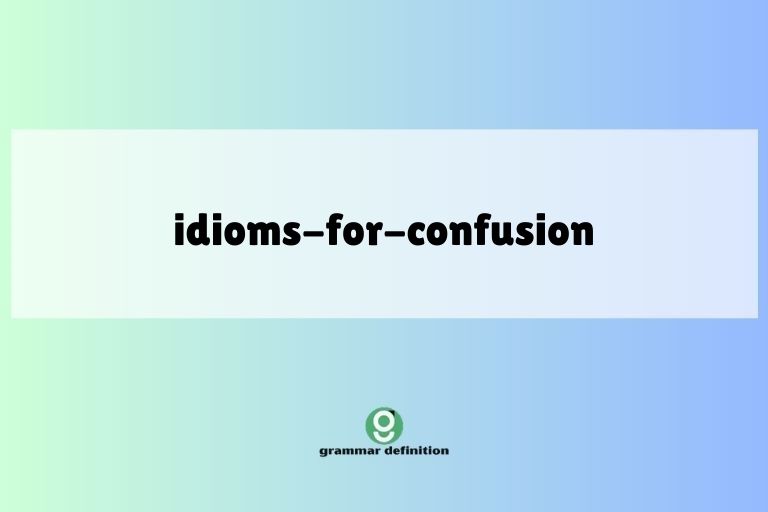Idioms for ‘Big’: Expanding Your English Vocabulary

Idioms add color and depth to the English language, allowing native speakers to communicate nuanced ideas in a concise and often humorous way. Learning idioms, particularly those related to size, quantity, and importance, is crucial for understanding everyday conversations, literature, and media.
This article focuses on idioms that convey the concept of ‘big’ – whether referring to physical size, significance, or impact. By mastering these idioms, English learners can enhance their comprehension skills and speak more fluently and expressively.
This guide is designed for English language learners of all levels, from intermediate to advanced. Whether you’re preparing for an English proficiency exam, aiming to improve your conversational skills, or simply interested in expanding your vocabulary, this article will provide you with the knowledge and practice you need to confidently use idioms for ‘big’.
Get ready to dive into a world of colorful expressions and unlock a new dimension of English communication!
Table of Contents
- Introduction
- What are Idioms for ‘Big’?
- Structural Breakdown of Idioms
- Types and Categories of Idioms for ‘Big’
- Examples of Idioms for ‘Big’
- Usage Rules for Idioms
- Common Mistakes When Using Idioms
- Practice Exercises
- Advanced Topics: Nuances and Regional Variations
- Frequently Asked Questions
- Conclusion
What are Idioms for ‘Big’?
Idioms are expressions whose meanings cannot be understood from the literal meanings of the individual words. They are a type of figurative language that adds richness and complexity to communication.
Idioms for ‘big’ specifically denote concepts related to size, quantity, importance, or impact, but in a non-literal and often imaginative way. Understanding these idioms requires familiarity with their conventional meanings within a particular language and culture.
These idioms function as single units of meaning, often acting as adjectives, adverbs, or verbs within a sentence. For example, instead of saying something is “very important,” you might say it’s “a big deal.” The phrase “a big deal” functions as an adjective modifying the subject, but its meaning goes beyond the literal size of something.
It signifies its significance or consequence.
The context in which an idiom is used is crucial for proper interpretation. The same idiom can have slightly different connotations depending on the situation and the speaker’s intent.
Therefore, understanding the cultural and social context surrounding an idiom is just as important as knowing its definition.
Structural Breakdown of Idioms
Idioms, unlike regular phrases, don’t follow standard grammatical rules for interpretation. Their meaning is derived from convention rather than composition.
However, analyzing their structure can still be helpful in understanding how they function within a sentence.
Many idioms for ‘big’ consist of a combination of nouns, adjectives, verbs, and prepositions. For instance, “a whale of a time” uses the noun “whale” to exaggerate the experience of having a good time.
The structure “a [noun] of a [noun]” is a common pattern in English idioms used for emphasis.
Other idioms might involve metaphorical comparisons, such as “larger than life,” which compares a person’s character or personality to something that exceeds normal expectations. The structure “larger than [noun]” is used to indicate something that is exaggerated or extraordinary.
Understanding these structural patterns can help learners recognize and remember idioms more easily. While the meaning of the idiom cannot be directly inferred from the individual words, recognizing recurring structures can aid in comprehension and recall.
Furthermore, knowing the grammatical function of the idiom (e.g., adjective, adverb) allows for its correct placement within a sentence.
Types and Categories of Idioms for ‘Big’
Idioms for ‘big’ can be categorized based on the aspect they emphasize: size and quantity, importance and significance, or impact and effect. Understanding these categories can help learners choose the most appropriate idiom for a given situation.
Idioms Referring to Size and Quantity
These idioms describe something that is physically large or exists in great numbers. They often use metaphors and exaggerations to emphasize the scale or extent of something.
Idioms Referring to Importance and Significance
These idioms highlight the importance, relevance, or consequence of something. They often use figurative language to convey the weight or impact of a situation or event.
Idioms Referring to Impact and Effect
These idioms describe the significant influence or effect that something has on a person, situation, or event. They often use metaphors to convey the strength or extent of the impact.
Examples of Idioms for ‘Big’
The following sections provide extensive examples of idioms for ‘big’, categorized by their primary meaning. Each example includes a definition and an example sentence to illustrate its usage.
Examples for Size and Quantity
This table presents idioms related to size and quantity, offering a variety of ways to express large dimensions or amounts. Each idiom is defined and demonstrated in a sentence for clarity.
| Idiom | Definition | Example Sentence |
|---|---|---|
| A whale of a something | A large or impressive example of something. | The party was a whale of a time! |
| A boatload of something | A large quantity of something. | He has a boatload of patience dealing with those kids. |
| Tons of something | A very large amount of something. | I have tons of work to do before the deadline. |
| Oodles of something | A great quantity of something. | She has oodles of charm and charisma. |
| A mountain of something | A large amount of something, often problems or work. | We have a mountain of paperwork to get through. |
| By leaps and bounds | Progressing or growing rapidly. | Her English improved by leaps and bounds after she moved to London. |
| In droves | In large numbers. | People came to the concert in droves. |
| A plethora of something | An excess or overabundance of something. | The buffet offered a plethora of desserts. |
| A sea of something | A large expanse or quantity of something. | There was a sea of faces in the crowd. |
| A world of something | A large amount of something. | This book opened up a world of possibilities for me. |
| A stack of something | A large pile or quantity of something. | I have a stack of books to read this summer. |
| Galore | In abundance; plentiful. | There were decorations galore at the Christmas party. |
| A heap of something | A large pile or quantity of something. | He has a heap of clothes to wash. |
| Massive | Extremely large or substantial. | The company made a massive profit this year. |
| Prodigious | Remarkably or impressively great in extent, size, or degree. | She has a prodigious talent for music. |
| Sizeable | Fairly large. | They donated a sizeable amount of money to the charity. |
| Substantial | Of considerable importance, size, or worth. | The new evidence provided a substantial boost to the case. |
| Voluminous | Occupying or containing much space; bulky. | The report was voluminous and difficult to read. |
| Extensive | Covering or affecting a large area. | The fire caused extensive damage to the building. |
| Immense | Extremely large or great, especially in scale or degree. | The view from the mountaintop was immense. |
| A wealth of something | A large amount or supply of something valuable. | The museum has a wealth of historical artifacts. |
| A cornucopia of something | An abundant supply of good things of a specified kind. | The farmers market was a cornucopia of fresh produce. |
| A deluge of something | A severe flood; a heavy fall of rain; a great quantity of something arriving at the same time. | The company received a deluge of complaints after the product launch. |
| A flood of something | A large quantity of something arriving at the same time. | After the announcement, there was a flood of applications. |
| Scores of something | A large number of people or things. | Scores of people attended the protest. |
Examples for Importance and Significance
This table focuses on idioms that highlight the importance or significance of something. These expressions are useful for conveying the weight or impact of a particular situation or event.
| Idiom | Definition | Example Sentence |
|---|---|---|
| A big deal | Something important or significant. | Getting into that university is a big deal. |
| Of great consequence | Very important; having significant results. | The decision was of great consequence to the company’s future. |
| Carries weight | To have influence or importance. | His opinion carries a lot of weight in the committee. |
| Holds sway | To have power or influence over someone or something. | Tradition still holds sway in many rural communities. |
| The be-all and end-all | The most important thing; the ultimate goal. | Success isn’t the be-all and end-all of life. |
| Paramount | More important than anything else; supreme. | Safety is paramount in this industry. |
| Of the essence | Absolutely necessary; crucial. | Time is of the essence if we want to catch the flight. |
| A matter of life and death | A situation of utmost importance; a critical situation. | For the patient, the surgery was a matter of life and death. |
| Crucial | Decisive or critical, especially in the success or failure of something. | Teamwork is crucial for the success of this project. |
| Vital | Absolutely necessary or important; essential. | Water is vital for survival. |
| Significant | Sufficiently great or important to be worthy of attention; noteworthy. | The discovery was significant for the field of medicine. |
| Momentous | Of great importance or significance, especially in its bearing on the future. | The invention of the printing press was a momentous event. |
| Far-reaching | Having considerable and widespread effects. | The new policy has far-reaching implications for the economy. |
| Weighty | Having great importance or influence. | The issue is a weighty one and requires careful consideration. |
| Key | Of crucial importance. | Education is key to a brighter future. |
| Central | Of the greatest importance; principal. | Customer satisfaction is central to our business strategy. |
| Cardinal | Of the greatest importance; fundamental. | Honesty is a cardinal virtue. |
| Principal | Most important or influential. | The principal reason for the company’s success is its innovative products. |
| Foremost | Most prominent in rank, importance, or position. | Safety is the company’s foremost concern. |
| High-priority | Of great importance and needing to be dealt with first. | This task is high-priority and needs to be completed today. |
| Of great import | Of great importance; significant. | The news was of great import to the entire nation. |
| A game-changer | A newly introduced element or factor that changes an existing situation or activity in a significant way. | The new technology is a game-changer for the industry. |
| Makes all the difference | To have a very significant effect or impact. | A little encouragement makes all the difference. |
| The main thing | The most important aspect or point. | The main thing is that everyone is safe. |
| The bottom line | The most important thing; the essential point. | The bottom line is, we can’t afford it. |
Examples for Impact and Effect
This table showcases idioms that describe a significant impact or effect. These are useful for illustrating the magnitude of influence something has on a situation or person.
| Idiom | Definition | Example Sentence |
|---|---|---|
| Pack a punch | To have a strong effect or impact. | That small car really packs a punch! |
| Make a splash | To attract a lot of attention; to be very successful. | The new movie made a big splash at the box office. |
| Rock the boat | To disturb a stable situation; to cause trouble. | I don’t want to rock the boat by complaining. |
| Move mountains | To overcome great obstacles; to achieve something difficult. | She’s willing to move mountains to help her family. |
| Turn the world upside down | To cause great disruption or upheaval. | The new invention turned the world upside down. |
| Have a ripple effect | To have a spreading or cascading impact. | The company’s decision had a ripple effect on the entire community. |
| Leave its mark | To have a lasting effect or influence. | The war left its mark on the country. |
| Cast a long shadow | To have a significant and lasting influence or effect. | The scandal cast a long shadow over his career. |
| Have a domino effect | When one event sets off a chain of similar events. | The company’s bankruptcy had a domino effect on its suppliers. |
| A shot in the arm | Something that gives renewed energy or confidence. | The new contract was a shot in the arm for the company. |
| Make waves | To cause a disturbance or controversy. | The politician’s comments made waves in the media. |
| Carry a lot of weight | To be influential or important. | His opinion carries a lot of weight with the board of directors. |
| To have a profound impact | To have a deep and significant effect. | The teacher had a profound impact on her students’ lives. |
| A major influence | Someone or something that greatly affects someone or something. | His father was a major influence on his career choice. |
| To shape something | To determine the form or development of something. | Her experiences shaped her into the person she is today. |
| To leave a legacy | To leave behind a lasting impact or contribution. | He left a legacy of innovation and leadership. |
| To have a lasting effect | To have an impact that continues for a long time. | The therapy had a lasting effect on her mental health. |
| To change the landscape | To alter the fundamental characteristics or conditions of a particular area. | The new technology changed the landscape of the industry. |
| To revolutionize something | To completely change something. | The internet revolutionized communication. |
| To transform something | To make a thorough or dramatic change in the form, appearance, or character of something. | The renovation transformed the old house into a modern home. |
| To have far-reaching consequences | To have effects that are widespread and lasting. | The decision to cut funding had far-reaching consequences. |
| To alter the course of something | To change the direction or outcome of something. | The discovery of penicillin altered the course of medicine. |
| To tip the scales | To change the balance of power or influence. | The new evidence tipped the scales in favor of the defendant. |
| To set the stage for something | To create the conditions for something to happen. | The agreement set the stage for future negotiations. |
| To pave the way for something | To create the conditions for something to happen. | The research paved the way for new treatments. |
Usage Rules for Idioms
Using idioms correctly requires understanding their specific contexts and grammatical functions. Here are some general rules to keep in mind:
- Context is key: Pay attention to the situation and the speaker’s intent. Idioms can have different connotations depending on the context.
- Grammatical function: Understand whether the idiom functions as an adjective, adverb, verb, or noun phrase. Use it accordingly in the sentence.
- Word order: Idioms have fixed word orders. Do not change the order of the words, as it will alter the meaning or make the idiom nonsensical.
- Verb tense: Adjust the verb tense within the idiom as needed to match the context of the sentence. For example, “It was a big deal” (past tense) vs. “It is a big deal” (present tense).
- Cultural sensitivity: Be aware that some idioms may be offensive or inappropriate in certain cultural contexts.
Common Mistakes When Using Idioms
Learners often make mistakes when using idioms due to their non-literal nature. Here are some common errors to avoid:
| Incorrect | Correct | Explanation |
|---|---|---|
| The exam was a big business. | The exam was a big deal. | “Big deal” is the correct idiom for something important. |
| He has tons of works to do. | He has tons of work to do. | “Work” is uncountable, so it doesn’t take a plural form. |
| She improved with jumps and limits. | She improved by leaps and bounds. | The correct idiom is “by leaps and bounds”. |
| The problem is of the essence time. | Time is of the essence. | The word order is fixed in this idiom. |
| He made a big water at the party. | He made a splash at the party. | “Make a splash” is the correct idiom. |
Practice Exercises
Test your knowledge of idioms for ‘big’ with these practice exercises. Choose the correct idiom to complete each sentence.
Exercise 1: Fill in the Blanks
| Question | Options | Answer |
|---|---|---|
| 1. Getting this promotion is ________ for my career. | a) a small thing, b) a big deal, c) a tiny matter | b) a big deal |
| 2. The company made ________ of money this year. | a) a little, b) tons, c) a smidgen | b) tons |
| 3. Her English has improved ________ since she started taking classes. | a) slowly, b) by leaps and bounds, c) a little | b) by leaps and bounds |
| 4. ________ is of the essence if we want to finish the project on time. | a) Effort, b) Time, c) Money | b) Time |
| 5. The new product is expected to ________ in the market. | a) make a small ripple, b) make a splash, c) make a tiny wave | b) make a splash |
| 6. The storm caused ________ damage to the coastal areas. | a) minimal, b) extensive, c) slight | b) extensive |
| 7. The museum has ________ of ancient artifacts. | a) a scarcity, b) a wealth, c) a lack | b) a wealth |
| 8. He is willing to ________ to help his community. | a) move pebbles, b) move mountains, c) move grains of sand | b) move mountains |
| 9. The decision to invest in renewable energy had ________. | a) a ripple effect, b) a stagnant effect, c) a still effect | a) a ripple effect |
| 10. Her contributions to the field of medicine ________. | a) left a minor scratch, b) left its mark, c) left a small impression | b) left its mark |
Exercise 2: Sentence Completion
| Question | Answer |
|---|---|
| 1. The new policy had ________ consequences for the environment. | far-reaching |
| 2. His opinion ________ with the board of directors. | carries a lot of weight |
| 3. The company received ________ of complaints after the price increase. | a deluge |
| 4. The discovery of the new element ________ for future technologies. | paved the way |
| 5. The success of the project ________ on teamwork. | is crucial |
| 6. The new evidence ________ in favor of the defendant. | tipped the scales |
| 7. The festival had decorations ________. | galore |
| 8. She has ________ of patience when dealing with difficult customers. | a boatload |
| 9. The politician’s speech ________ in the media. | made waves |
| 10. His innovative ideas ________ the company’s growth. | transformed |
Advanced Topics: Nuances and Regional Variations
At an advanced level, understanding the subtle nuances and regional variations of idioms is crucial. Some idioms may have slightly different meanings or connotations depending on the region or cultural context.
For example, an idiom commonly used in American English might not be as familiar or have the same meaning in British English.
Furthermore, some idioms are more formal or informal than others. Using an overly formal idiom in a casual conversation or vice versa can sound unnatural or even humorous.
Pay attention to the register of the idiom and choose the appropriate one for the situation.
Finally, be aware of the historical and cultural origins of idioms. Understanding the background of an idiom can provide valuable insights into its meaning and usage.
This deeper understanding can help you use idioms more effectively and avoid potential cultural misunderstandings.
Frequently Asked Questions
- What is the difference between an idiom and a metaphor?
An idiom is a fixed expression whose meaning cannot be deduced from the literal meanings of its individual words. A metaphor, on the other hand, is a figure of speech that compares two unlike things to suggest a similarity. While some idioms may contain metaphors, not all metaphors are idioms. The key difference is that idioms have fixed meanings established by convention, while metaphors are more open to interpretation.
- How can I learn new idioms effectively?
The best way to learn idioms is through exposure and practice. Read extensively, listen to native speakers, and pay attention to how idioms are used in context. Keep a notebook of new idioms you encounter and try to use them in your own writing and conversations. Flashcards and online resources can also be helpful for memorizing idioms. Remember that understanding the context and cultural background of an idiom is just as important as knowing its definition.
- Are idioms the same across different English-speaking countries?
No, idioms can vary significantly across different English-speaking countries. Some idioms are specific to a particular region or country, while others may have different meanings or connotations in different places. For example, an idiom commonly used in American English might not be familiar or have the same meaning in British English. It’s important to be aware of these regional variations to avoid misunderstandings.
- Is it okay to use idioms in formal writing?
It depends on the context and the specific idiom. While idioms can add color and expressiveness to writing, they are generally more appropriate for informal or semi-formal contexts. In formal writing, such as academic papers or business reports, it’s usually best to avoid idioms and use more direct and precise language. However, some idioms are more widely accepted than others and may be appropriate even in formal writing. Use your judgment and consider your audience when deciding whether to use an idiom.
- How do I know when to use an idiom?
Use idioms when you want to add color, expressiveness, or humor to your communication. Idioms can also be useful for conveying complex ideas in a concise and memorable way. However, be careful not to overuse idioms, as this can make your writing or speech sound unnatural or forced. Choose idioms that are appropriate for the context and your audience, and make sure you understand their meanings and connotations before using them.
- What happens if I use an idiom incorrectly?
Using an idiom incorrectly can lead to confusion or miscommunication. At best, your audience may simply not understand what you’re trying to say. At worst, they may misunderstand your meaning or even find your usage humorous or offensive. If you’re not sure about the meaning or usage of an idiom, it’s best to avoid using it altogether. Instead, try to express your idea in a more direct and straightforward way.
- Can I create my own idioms?
While it’s technically possible to create your own idioms, it’s unlikely that they will be widely understood or accepted. Idioms are typically established by convention and cultural usage over time. If you try to create your own idiom, it may sound unnatural or nonsensical to native speakers. It’s generally best to stick to established idioms that are already widely understood.
- How can I tell if an expression is an idiom?
The easiest way to tell if an expression is an idiom is to consider whether its meaning can be deduced from the literal meanings of its individual words. If the expression has a meaning that is different from or more than the sum of its parts, it’s likely an idiom. You can also consult a dictionary or online resource to see if the expression is listed as an idiom.
Conclusion
Mastering idioms for ‘big’ is a valuable step in enhancing your English language skills. By understanding the nuances of these expressions, you can communicate more effectively and expressively.
Remember to pay attention to context, grammatical function, and cultural sensitivity when using idioms. Practice regularly, and don’t be afraid to experiment with new expressions.
With continued effort, you’ll be able to confidently incorporate idioms into your everyday conversations and writing.
Continue to expand your vocabulary and explore other areas of English grammar and usage. The more you learn, the more confident and fluent you will become.
Embrace the challenges and enjoy the journey of learning English!






